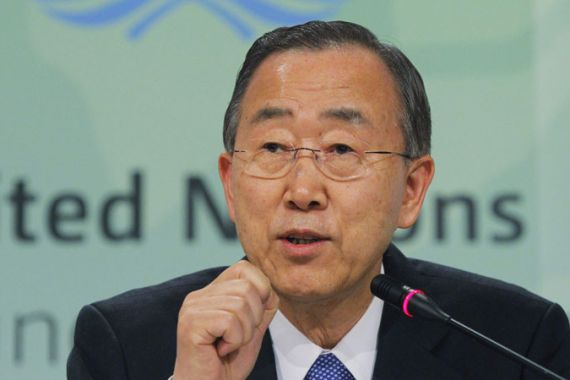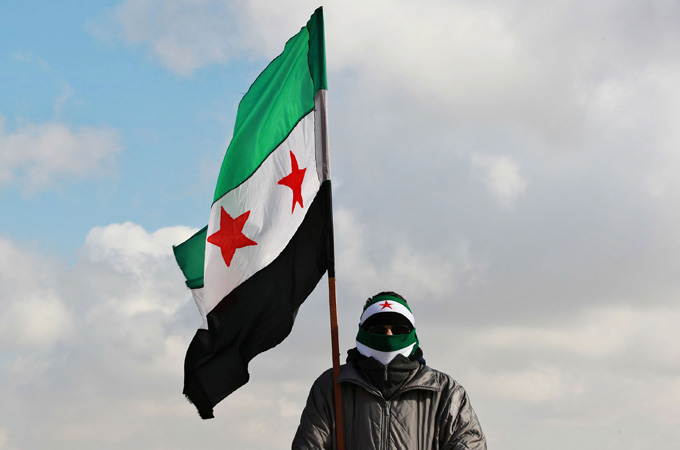Ban: Assad responsible for Syria deaths
Activists say 20 civilians killed on Saturday by security forces, as UN chief squarely blames government for violence.

 |
| The UN Secretary General said he is “extremely concerned” over the events in Syria at the moment [EPA] |
The United Nations secretary-general holds the Syrian president responsible for the events unfolding in his country over the last eight months, he has told Al Jazeera.
“As a leader of Syria [Bashar al-Assad] is responsible for all that has happened,” Ban Ki-moon said in an exclusive interview with Al Jazeera.
“He is the leader, and has a very important responsibility to protect the lives of his own people, therefore I would urge him again to stop immediately killing his people.”
“It is a totally unacceptable situation, and I am extremely concerned about what is going on in Syria,” he said.
Syrian activists with the Syrian Revolution General Commission (SRGC) said 20 civilians were killed on Saturday “by security forces” in the flashpoint regions of Homs, Deraa and Idlib, as well as in the suburbs of the capital, Damascus. The violence comes a day after 41 people were killed in clashes with security forces across the country.
Activists have warned of a likely “massacre” in Homs, which has been ringed by troops for more than two months.
Dr Ibrahim Nahel Othman, a founder of the Damascus Doctor’s Coordinating Committee, which provided medical aid to anti-government protesters, was killed in Saturday’s violence, a statement from the anti-government Local Co-ordination Committees said.
The umbrella activist group said that Othman was attempting to flee to Turkey to attempt to avoid arrest, but was shot dead in the village of Kherbet al-Jouz on the Syrian-Turkish border before he was able to leave the country.
The Syrian government has rejected the view that it is pursuing a crackdown on anti-government protesters.
“There is no policy of crackdown,” Jihad Makdesi, a foreign ministry spokesman, told the Reuters news agency. “The Syrian forces are there to protect civilians and maintain law and order that is breached by those who are carrying arms against the State.
“The story of peacefulness of the protest is no longer a valid story in some places,” he said. “Syria needs evolution and not armed confrontation.”
The opposition Syrian National Council said in a statement about Homs on Friday: “News reports, videos and information from activists indicate that the regime is preparing to commit a massacre in the city to extinguish the flame of the revolution and ‘discipline’ the rest of Syria’s cities.”
However, some activists questioned whether the SNC statement was intended principally to galvanise international action. One campaigner in Homs, a city of 1.5 million, saw little sign of an imminent offensive on Saturday: “I have been hearing this since yesterday. I did a tour around the city and I did not see anything unusual.
“It’s the same checkpoints and the same number of soldiers.”
Civil disobedience
Activists also called for a campaign of civil disobedience from Sunday, the first day of the working week in Syria, with sit-ins at work, the closure of shops, universities and later a general strike.
The Local Coordination Committees, which organises anti-government protests on the ground in Syria, said the campaign would “snowball” and the strike is “the first step in an overall civil disobedience” campaign to overthrow the regime.
Meanwhile an Arab League ministerial meeting slated for Saturday to mull a response to Syria which wants the bloc to lift sanctions in return for allowing in observers to monitor the unrest, was postponed.
Arab League chief Nabi al-Arabi suggested convening the meeting in mid-December at the bloc’s Cairo headquarters, a diplomat said.
UN Human Rights Commissioner Navi Pillay is to brief the UN Security Council about Syria and the wider Middle East at a meeting on Monday, her second address to the world body since August when the number of dead was estimated at more than 2,000.
“Now it is more than 4,000. Lives could have been changed if action had been taken sooner. It is not for me to determine what kind of action, it is for the Security Council,” she told a UN news conference on Friday.